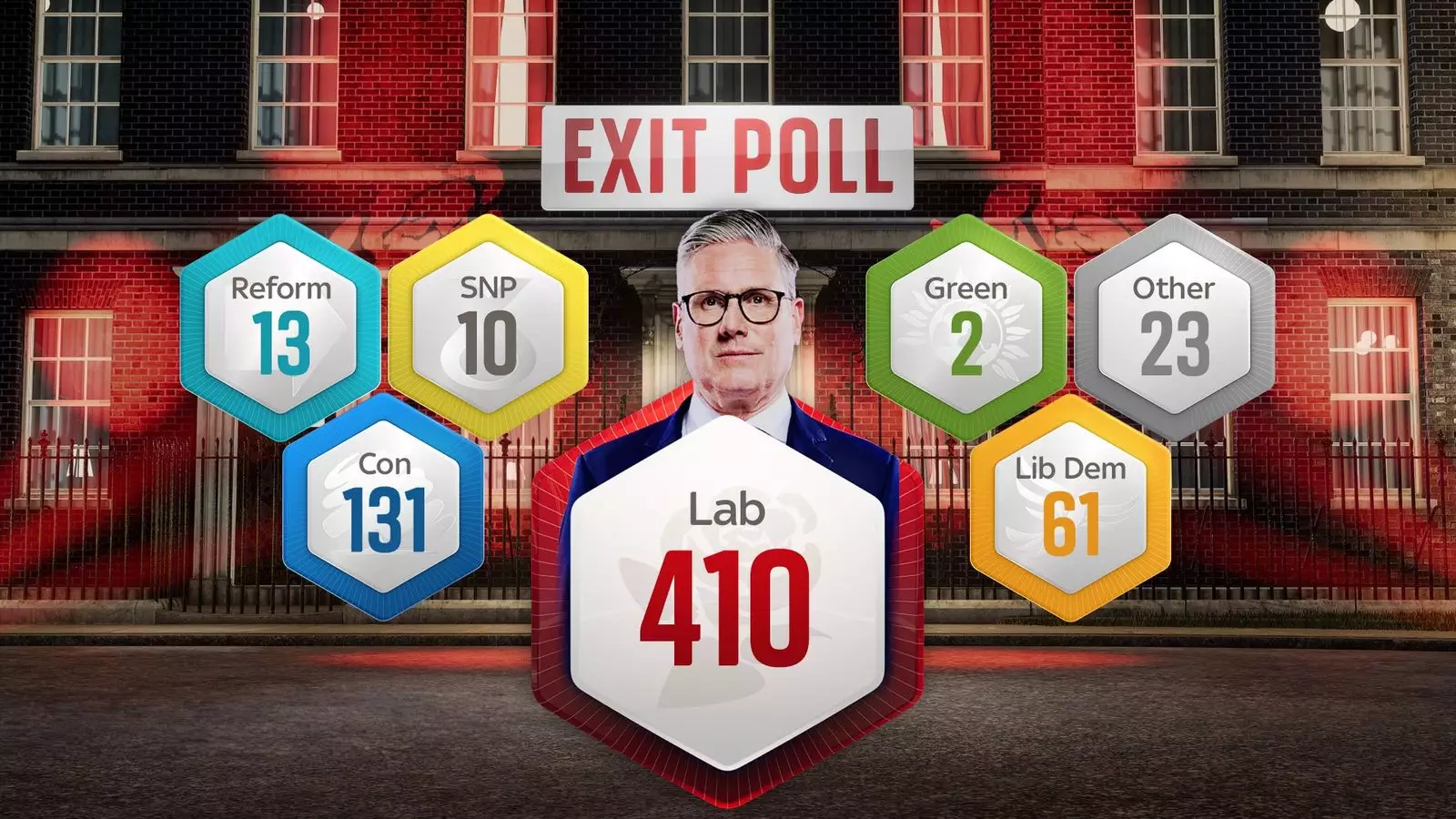The recent general election in the UK has yielded a profound result, marking a significant political shift after 14 years under Conservative leadership. The exit polls, revealing Labour’s anticipated landslide victory, indicate that Sir Keir Starmer’s party is poised to capture approximately 410 seats. This comes as a stark contrast to the Conservative Party’s forecasted total of only 131, a drop from the 365 seats they held following the 2019 election. If realized, this outcome represents a seismic shift in the political landscape, possibly placing the Conservatives at their historically lowest seat count.
The implications of such a result extend beyond mere numbers, signaling a public frustration with Conservative policies and governance over the last decade. Key senior Conservative figures, including Chancellor Jeremy Hunt and Defence Secretary Grant Shapps, are expected to lose their parliamentary seats, raising questions about the future direction of the party and its leadership.
In light of these projections, Labour’s deputy leader Angela Rayner has cautiously acknowledged the encouraging nature of the exit polls, urging the party to remain focused until the final results are confirmed. She credited Sir Keir Starmer for his transformative leadership style, noting his effective communication of a governing agenda that resonates with the electorate. This reversal in support for Labour not only reflects the party’s revitalization under new leadership but also indicates a collective yearning for change among voters.
It is noteworthy that Labour’s success might not surpass the 179-seat majority achieved by Tony Blair in 1997. Such statistics serve as a reminder that while the party has gained ground—doubling its seat tally from the previous election—it has done so with a somewhat muted voter turnout compared to previous years, particularly the strong response seen during Jeremy Corbyn’s tenure.
The exit polls also suggest an intriguing reshaping of party dynamics in Parliament. The Liberal Democrats are forecasted to make substantial gains, moving from merely 11 seats to approximately 61, thereby reclaiming their place as the third-largest party in the House of Commons, overtaking the Scottish National Party (SNP). With such a strong performance, Lib Dem leader Sir Ed Davey expressed his gratitude, crediting a campaign focused on health and welfare, pivotal issues that resonated with many voters.
Conversely, the SNP appears poised to experience a dramatic decline, dropping from 52 seats to a mere 10, which may become a point of reflection within the party. SNP leader John Swinney has described their campaign as positive, yet the shift in voter sentiment suggests challenges ahead for nationalist governance in Scotland. This result may prompt a reevaluation of SNP strategies and policies moving forward, particularly in light of an electorate eager for change.
The election projections signal a considerable crisis within the Conservative Party, with discussions among party members indicating a pressing need for reflection and restructuring. Former justice secretary Sir Robert Buckland highlighted the importance of recognizing the scale of this defeat and suggested a period of introspection for the party. Such internal evaluations are vital for the Conservatives as they confront mounting public disenchantment and search for a pathway to regain voter trust.
The campaign’s misfortunes, including questionable decision-making from Prime Minister Rishi Sunak, have fostered a narrative of incompetence. From his blunder during the D-Day commemorations to communication errors that portrayed a losing battle, Sunak’s leadership may be scrutinized heavily in the wake of this election. The not-so-great election tactics, compounded by public perceptions of the party’s failings on pressing economic issues—especially concerning mortgaged households—have likely contributed to this impending loss.
As the dust settles from this monumental election, Labour’s leadership faces the challenge of translating newfound political capital into effective governance. The population has demonstrated a clear appetite for policy shifts, and Labour must capitalize on this momentum to implement reforms that reflect the public’s demands.
Conversely, the Conservative Party must recommit to understanding the voters’ needs and addressing the factors that led to their electoral downfall. Rebuilding party credibility and popularity will take time, patience, and, most importantly, a willingness to innovate and listen to the electorate’s concerns.
In contemplating the future, both Labour and the Conservatives must navigate a complex democratic landscape reshaped by the outcomes of this election. In the end, the potential for a new political narrative is palpable, leaving citizens hopeful yet vigilant about the changes ahead.


Leave a Reply